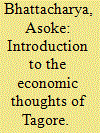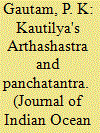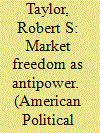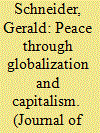|
|
|
Sort Order |
|
|
|
Items / Page
|
|
|
|
|
|
|
| Srl | Item |
| 1 |
ID:
101046


|
|
|
| 2 |
ID:
130604


|
|
|
|
|
| Publication |
2014.
|
| Summary/Abstract |
Kautilya"s Arthasastra composed and compiled, in Sanskrit, between the 4"' Century BCE to the 3"' Century CE, is an exhaustive treatise on statecraft and issues of diplomacy, war, peace. intelligence, security, law, and political economy. Discovered in full text form in the early 1900s and then translated into English and
other languages, it is one gem of political theory which stands out prominently in the corpus of the rich but under-explored indigenous ancient history of India. Johann Jakob Meyer, the German lndologist and translator of the work from Sanskrit to German in 1927, remarked that Kautizya's Arthasastra is not a book but a library of ancient India.
|
|
|
|
|
|
|
|
|
|
|
|
|
|
|
|
| 3 |
ID:
127818


|
|
|
|
|
| Publication |
2013.
|
| Summary/Abstract |
Historically, republicans were of different minds about markets: some, such as Rousseau, reviled them, while others, like Adam Smith, praised them. The recent republican resurgence has revived this issue. Classical liberals such as Gerald Gaus contend that neorepublicanism is inherently hostile to markets, while neorepublicans like Richard Dagger and Philip Pettit reject this characterization-though with less enthusiasm than one might expect. I argue here that the right republican attitude toward competitive markets is celebratory rather than acquiescent and that republicanism demands such markets for the same reason it requires the rule of law: because both are essential institutions for protecting individuals from arbitrary interference. I reveal how competition restrains-and in the limit, even eradicates-market power and thereby helps us realize "market freedom," i.e., freedom as nondomination in the context of economic exchange. Finally, I show that such freedom necessitates "Anglo-Nordic" economic policies
|
|
|
|
|
|
|
|
|
|
|
|
|
|
|
|
| 4 |
ID:
128865


|
|
|
|
|
| Publication |
2014.
|
| Summary/Abstract |
The security externalities of globalization and capitalism continue to play an influential role in peace research. Typical contributions to these interrelated areas of scientific inquiry address the hope that the external openness (commercial liberalism) and the internal freedom of an economy (capitalist peace) pacify interstate as well as intrastate relations. I claim, despite the empirical support both theses have received, that they face considerable analytical hurdles. Commercial liberalism has, on a theoretical level, not yet moved much beyond the opportunity cost arguments that enlightenment philosophers first advanced more than 200 years ago. The capitalist peace research program similarly does not offer clear micro-level mechanisms explaining why the interactions between economic agents and political decisionmakers should be more peaceful in capitalist than in state-dominated economies. Drawing on the political economy literature, I argue that economic liberalism should distinguish between level- and change-effects of both globalization and capitalism and that thinking in analogies between domestic and interstate peace has prevented the field from making analytical headway. Both literatures will only profit from the advent of 'big data' in the case that the field addresses the theoretical challenges upfront.
|
|
|
|
|
|
|
|
|
|
|
|
|
|
|
|
| 5 |
ID:
132159


|
|
|
|
|
| Publication |
2014.
|
| Summary/Abstract |
The state is the most precious of human possessions," the economist Alfred Marshall remarked in 1919, toward the end of his life, "and no care can be too great to be spent on enabling it to do its work in the best way." For Marshall, one of the founders of modern economics and a mentor to John Maynard Keynes, this truth was self-evident. Marshall believed that the best way to solve the central paradox of capitalism -- the existence of poverty among plenty -- was to improve the quality of the state. And the best way to improve the quality of the state was to produce the best ideas. That is why Marshall read political theorists as well as economists, John Locke as well as Adam Smith, confident that studying politics might lead not only to a fuller understanding of the state but also to practical steps to improve governance.
|
|
|
|
|
|
|
|
|
|
|
|
|
|
|
|
|
|
|
|
|